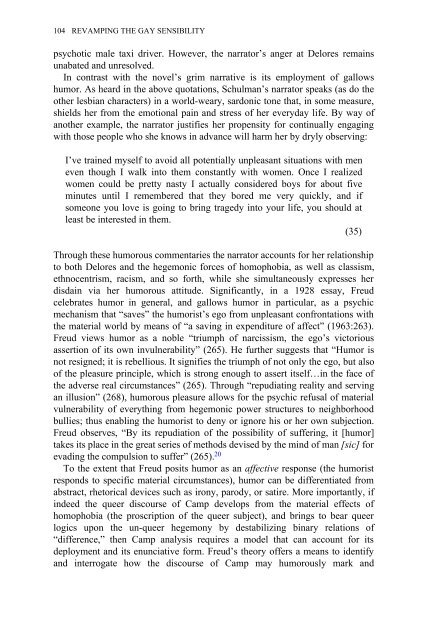Edited by Moe Meyer - Get a Free Blog
Edited by Moe Meyer - Get a Free Blog
Edited by Moe Meyer - Get a Free Blog
Create successful ePaper yourself
Turn your PDF publications into a flip-book with our unique Google optimized e-Paper software.
104 REVAMPING THE GAY SENSIBILITY<br />
psychotic male taxi driver. However, the narrator’s anger at Delores remains<br />
unabated and unresolved.<br />
In contrast with the novel’s grim narrative is its employment of gallows<br />
humor. As heard in the above quotations, Schulman’s narrator speaks (as do the<br />
other lesbian characters) in a world-weary, sardonic tone that, in some measure,<br />
shields her from the emotional pain and stress of her everyday life. By way of<br />
another example, the narrator justifies her propensity for continually engaging<br />
with those people who she knows in advance will harm her <strong>by</strong> dryly observing:<br />
I’ve trained myself to avoid all potentially unpleasant situations with men<br />
even though I walk into them constantly with women. Once I realized<br />
women could be pretty nasty I actually considered boys for about five<br />
minutes until I remembered that they bored me very quickly, and if<br />
someone you love is going to bring tragedy into your life, you should at<br />
least be interested in them.<br />
(35)<br />
Through these humorous commentaries the narrator accounts for her relationship<br />
to both Delores and the hegemonic forces of homophobia, as well as classism,<br />
ethnocentrism, racism, and so forth, while she simultaneously expresses her<br />
disdain via her humorous attitude. Significantly, in a 1928 essay, Freud<br />
celebrates humor in general, and gallows humor in particular, as a psychic<br />
mechanism that “saves” the humorist’s ego from unpleasant confrontations with<br />
the material world <strong>by</strong> means of “a saving in expenditure of affect” (1963:263).<br />
Freud views humor as a noble “triumph of narcissism, the ego’s victorious<br />
assertion of its own invulnerability” (265). He further suggests that “Humor is<br />
not resigned; it is rebellious. It signifies the triumph of not only the ego, but also<br />
of the pleasure principle, which is strong enough to assert itself…in the face of<br />
the adverse real circumstances” (265). Through “repudiating reality and serving<br />
an illusion” (268), humorous pleasure allows for the psychic refusal of material<br />
vulnerability of everything from hegemonic power structures to neighborhood<br />
bullies; thus enabling the humorist to deny or ignore his or her own subjection.<br />
Freud observes, “By its repudiation of the possibility of suffering, it [humor]<br />
takes its place in the great series of methods devised <strong>by</strong> the mind of man [sic] for<br />
evading the compulsion to suffer” (265). 20<br />
To the extent that Freud posits humor as an affective response (the humorist<br />
responds to specific material circumstances), humor can be differentiated from<br />
abstract, rhetorical devices such as irony, parody, or satire. More importantly, if<br />
indeed the queer discourse of Camp develops from the material effects of<br />
homophobia (the proscription of the queer subject), and brings to bear queer<br />
logics upon the un-queer hegemony <strong>by</strong> destabilizing binary relations of<br />
“difference,” then Camp analysis requires a model that can account for its<br />
deployment and its enunciative form. Freud’s theory offers a means to identify<br />
and interrogate how the discourse of Camp may humorously mark and


